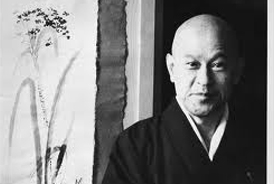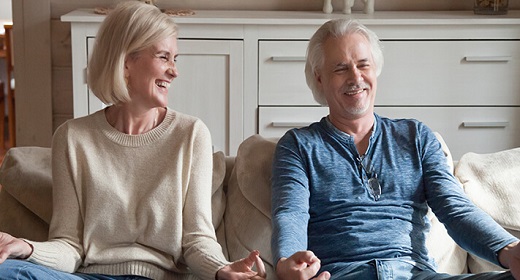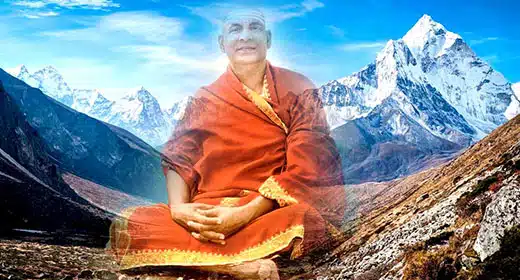by Shunryu Suzuki: This lecture is reprinted from the October 2001 Berkeley Zen Center Newsletter.
The purpose of sesshin is to be completely one with our practice. We use two Chinese characters for “sesshin.” “Ses” means to treat something the way one treats a guest or the way a student treats a teacher. Another meaning of “ses” is to control or arrange things in order. “Shin” means mind or heart. So sesshin means to have proper functioning of mind. When we say “control,” it is our five senses and our will, or small monkey mind which should be controlled. We control our monkey mind in order to resume our true Big Mind. When monkey mind is always taking over the activity of Big Mind, we naturally become a monkey. So monkey mind must have his boss, which is Big Mind.
However, when we practice zazen, it does not mean that Big Mind is controlling small mind, but simply that when small mind becomes calm, Big Mind starts its true activity. Most of the time in our everyday life, we are involved in the activity of small mind. That is why we should practice zazen and be completely involved in resuming Big Mind.
A good example of our practice is a turtle, which has four legs, a head, and a tail – six parts of his body which are sometimes outside of the shell and sometimes inside. When you want to eat or go out, your four legs are out, but if they are always out, you will be caught by something. In case of danger you should draw in the legs, head, and tail. This is sesshin. For one week, our head, tail, and legs should be inside the shell. Then no one can touch you. In the scriptures, it says even demons or devils cannot destroy you if the six parts of our body are inside the shell. The six parts refer to the five senses and the mind.
In zazen we do not try to stop thinking or try not to hear or see anything. If something appears in your mind, leave it. If you hear something, hear it, and just accept it. That is all. No second activity should appear in your zazen. Sound is one activity. The second is asking, “What is that sound? Is it a motor car or a garbage truck or something?” If you hear a sound, that is all. You hear it. You don’t make any judgment. You do not figure out what it is. Just open your ears and hear something. Just open your eyes and see something.
Although being concentrated on something useful, calmness of mind is also necessary. So don’t intensify the activity of the five sense organs. When you are sitting for a pretty long time, watching the same place on the wall, you may see various things. Something looks like a river or a dragon. This may be a great way to kill time, but it is not sesshin. Just leave your sense organs alone. That is how you free your true mind, how you open the true mind. When you can do so in everyday life you will have a soft mind. You won’t have any preconceived ideas, and the bad habits in your way of thinking will not be overpowering. You will have generous mind and Big Mind, and what you say will help others.
In the Zuimonki, Dogen Zenji tells a story which exemplifies this calmness of mind. He says there was an influential person, Ichigyo Motoiye, whose sword was stolen. Since no one else could have broken into his house, some of his men must have stolen it. The sword was found and taken back to him, but Motoiye said, “This is not my sword, so give it back to the one who owns it.” Most people knew that the man who had the sword was the one who had stolen it, but because Motoiye didn’t accuse him of it, no one could do anything. So nothing happened. That kind of calmness of mind is the mind we should have in Zen.
Dogen also emphasized a sparse, simple life. Without expecting anything, just practice our way. Many students asked Dogen how it is possible to support the temple or sangha without any plan. He said, “If it becomes difficult to support the temple, we will think about it. But until then, it is not necessary to think about it.” So before something happens, it is not our way to think about it too much. If we have generous Big Mind and if we have a strong spirit of practice, then there is no need to worry about anything. That is the way to have complete calmness of your mind. Because you have something, you worry about losing it, but if you don’t have anything, there is no need to worry.
One night Dogen said, “Even if you think a teaching is complete and right, when someone tells you a better way, you should change your understanding of the teaching.” In this way, we improve our understanding of the teaching forever. That is our way. Because you think it is right at that time, you follow the history or rules, but you have some space in your mind to change the idea. That is soft mind.
It is possible to change your ideas because you know what kind of monkey your thinking is. Sometimes you may follow the monkey’s suggestion, and say, “Oh yeah, that’s right. If we go that direction, we may have some food. Okay, let’s go!” But when there is something better, you may say, “Oh, monkey. Maybe it is better to go this way!” If you stick to your greed or anger or some bad emotional state of mind, if you stick to the thinking mind, your monkey mind, you cannot change. Your mind is not soft.
So in our practice, we rely on something great, and sit in that great space. The pain you have in your legs or some other difficulty is happening in that big space. As long as you do not lose the feeling that you are in the field of Buddha nature, you can sit though you have some difficulty. When you want to escape from your difficulty, or when you try to improve your practice in that big field, it means you have created another problem for yourself. But if you just exist there, then you will have a chance to appreciate your surroundings, and you can accept your self completely, without changing anything. That is our practice.
To exist in Big Mind is a kind of belief or faith, which is different from the usual faith of believing in some concrete idea or being. This is to believe that something is supporting us and supporting all our activities including thinking mind and emotional feelings. All these things are supported by something big, which has no form or color. It is impossible to know what it is, but something exists there, something, which is neither material nor spiritual. Something like that always exists, and that is where we exist. When you feel in that way, that is the pure feeling of being.
If you practice zazen and if you are brave enough to throw yourself into practice for seven days, you may have a little bit of understanding that will help your rigidness, your stubbornness. Almost all the problems we create because of our stubborn mind will vanish. If you have even the smallest understanding of reality, your way of thinking will completely change, and the problems you create will not be problems anymore. But it is also true that as long as we live we will have problems. So you shouldn’t practice zazen to attain some big enlightenment, which will change your whole being. That is not right understanding. That may be what people call “Zen,” but true Zen is not like that.
In this sesshin, we will concentrate on having the real experience of true practice. Forgetting all about gaining ideas, we will just sit here. If this room is too cold, we will make it warm, and if your legs become painful, you can stretch them. And if it is too difficult, you can rest, but we should continue our practice for seven days.









































